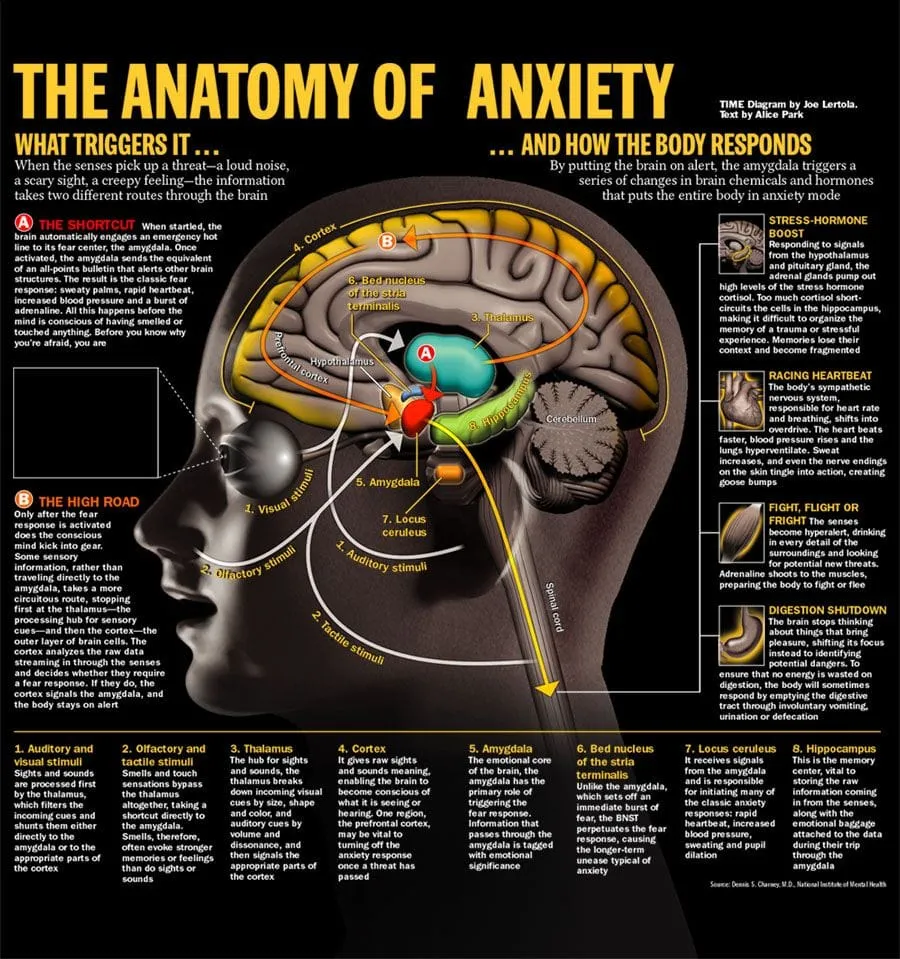Understanding Anxiety
Types of Anxiety
Take the Anxiety Self Test here
There are several recognized types of anxiety disorders, including:
- Panic disorder : People with this condition have feelings of terror that strike suddenly and repeatedly with no warning. Other symptoms of a panic attack include sweating, chest pain, palpitations (unusually strong or irregular heartbeats), and a feeling of choking, which may make the person feel like he or she is having a heart attack or "going crazy."
- Social anxiety disorder : Also called social phobia, social anxiety disorder involves overwhelming worry and self-consciousness about everyday social situations. The worry often centers on a fear of being judged by others, or behaving in a way that might cause embarrassment or lead to ridicule.
- Specific phobias : A specific phobia is an intense fear of a specific object or situation, such as snakes, heights, or flying. The level of fear is usually inappropriate to the situation and may cause the person to avoid common, everyday situations.
- Generalized anxiety disorder : This disorder involves excessive, unrealistic worry and tension, even if there is little or nothing to provoke the anxiety.
Symptoms vary depending on the type of anxiety disorder, but general symptoms include:
- Feelings of panic, fear, and uneasiness
- Problems sleeping
- Cold or sweaty hands and/or feet or numbness and tingling
- Shortness of breath
- Heart palpitations, Dizziness
- An inability to be still and calm
- Dry mouth
- Constant worry, ruminating, fear of things going wrong, fear of the future
- Nausea, stomach upset, sometimes loss of appetite
- Muscle tension
- Avoidance
What Causes Anxiety Disorders?
The exact cause of anxiety disorders is unknown; but anxiety symptoms or anxiety disorders are not the result of personal weakness, a character flaw, or poor upbringing. As scientists continue their research on mental illness, it is becoming clear that many of these disorders are caused by a combination of factors, including changes in the brain and environmental stress.
Like other brain illnesses, anxiety disorders may be caused by problems in the functioning of brain circuits that regulate fear and other emotions. Studies have shown that severe or long-lasting stress can change the way nerve cells within these circuits transmit information from one region of the brain to another. Other studies have shown that people with certain anxiety disorders have changes in certain brain structures that control memories linked with strong emotions. In addition, studies have shown that anxiety disorders run in families, which means that they can at least partly be inherited from one or both parents, like the risk for heart disease or cancer. Moreover, certain environmental factors -- such as a trauma or significant event -- may trigger an anxiety disorder in people who have an inherited susceptibility to developing the disorder.

How Are Anxiety Disorders Treated?
Fortunately, much progress has been made in the last two decades in the treatment of people with excessive anxiety. Although the exact treatment approach depends on the nature of the symptoms, one or a combination of the following therapies may be used for most anxiety disorders:
- Psychotherapy : Psychotherapy (a type of counseling) addresses the emotional response to mental illness. It is a process in which trained mental health professionals help people by talking through strategies for understanding and dealing with their disorder.
- Cognitive-behavioral therapy : This is a particular type of psychotherapy in which the person learns to recognize and change thought patterns and behaviors that lead to troublesome feelings. Requires Daily Homework.
- Dietary and lifestyle changes: See Anti-Anxiety Diet info
- Relaxation Therapy , Meditation, Mindfulness
- Medication, Herbs, Supplements : Depending upon the severity and duration of anxiety symptoms, medication may be recommended -- when other methods have not provided relief. In terms of over the counter supplements, L-Theanine (an Amino Acid) may help with mild symptoms of Anxiety, read more about L-Theanine, first studied and used in Japan for Anxiety . Herbs that may be helpful: Herbs for Anxiety
Call Laura for More Info (914) 232-7272
**Some information on this page comes from WEB MD